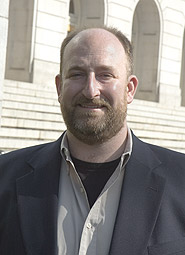Berkeleyan
Helping the campus keep its summer resolutions
New Summer Sessions director Rick Russo is promoting innovations to attract students - while still working to solve such longstanding problems as enrollment growth and crowded core-course classes
![]()
| 05 April 2006
Last year, when Rick Russo spotted an ad for Berkeley's Summer Sessions director position in the back of a professional association's newsletter, he saw an opportunity to realize a decade-long dream to live in the Bay Area. He also saw the chance to assume a more hands-on role after managing an $80 million enterprise with 10 units that each had a separate director.
 Rick Russo (Wendy Edelstein photo) |
"I could never say that I ran anything. I just managed people who ran things," he says with a self-effacing laugh of his previous work at Boston University (BU). In his new gig at Berkeley, Russo will be able to dream up programs and then implement them with the help of his 21-person staff.
Armed with an MBA, a CPA, and 12 years' experience in two different BU positions, Russo comes impressively equipped to direct the campus's summer program. At BU he first served as the director of finance and administration for the school's study-abroad program, then as the executive director of administration for its division of extended education.
While Berkeley's Summer Sessions may be more manageable than the small empire Russo oversaw at BU, it's not a small program. Summer Sessions offers more than 800 courses in five sessions staggered over the summer. The program gives students a complete array of classes, helps them enroll in the courses they need, and enables them to graduate on time or early.
Only three months into his position at Berkeley, Russo has already begun discussing new program ideas with deans, department chairs, and faculty, whom he characterizes as "excited and supportive" about the proposals.
In an effort to attract a larger cohort of high-school students to Summer Sessions, Russo has developed a new program that will market summer studies to that group, their parents, and high-school counselors. In past years, 150 to 200 high-school students have found their way to summer classes at Berkeley without any outreach effort from the campus. The proposed program, to pilot this summer, will include a special orientation for the young attendees, with workshops on college applications and essay writing, and a wrap-up session on the participants' experience as "temporary" college students.
Programs in the pipeline
With Berkeley core courses such as freshman composition and Chemistry 1A often over-enrolled in the fall and unavailable to new students, Summer Sessions' provisionally titled Early Freshman Program could address the problem. Russo's solution is to open sections of popular courses to newly admitted students in the Summer Session before their first fall semester, allowing students to take core classes early. Although the program isn't yet official, it's getting a good reception from crucial participants. "There are so many benefits to pulling this program off," says Russo. "Students get here early, get the courses they need, can acclimate to Berkeley, and find housing. The campus then has the benefit of the students taking impacted courses before the fall semester, relieving the pressure."
By 2007, Russo hopes, he'll have expanded Berkeley's Travel Study Program, which provides students with the opportunity to take courses in foreign locations, including new language programs in Madrid and Portugal (upping offerings from 12 to 14 sites). Such options would "increase the temptation for existing Berkeley and UC students to go abroad for the summer," he says. And upping the number of students in Summer Sessions and study-abroad programs helps the campus meet enrollment growth, mandated by the state and the UC system for 2000-10, without mushrooming the student population on campus during the fall and spring. "Every UC student that we can get to take a course in the summer releases a bit of the pressure during the academic year," explains Russo.
He is also exploring the possibility of mounting an academic- internship program in 2007 that combines work and academic components in a 12-unit package. Students would receive four units and valuable work experience through an internship, then would be required to take two courses associated with the internship. For example, a student who interns at the San Francisco Museum of Modern Art might be required to take art-history and museum- administration courses. "Students want internships and travel study," says Russo. "The truth is they're going to other institutions for those programs," which means more legwork for the students and a loss of funds for the campus.
How Summer Sessions works
Summer Sessions shares the revenue it generates from its programs with more than 50 participating departments, an incentive for their involvement, says Russo. "We're here to help them have a successful summer," he says. "Without Summer Sessions' marketing efforts, their programs wouldn't fill," because, in contrast to the academic year when there are nearly 10 applications for every spot, there's no guaranteed group of students showing up between the spring and fall semesters.
Russo views Summer Sessions as a "marketing and operations" endeavor, helping boost enrollment in summer courses. To that end he is introducing a faculty-outreach program, whereby professors in under-enrolled courses make five-minute presentations in spring-semester classes to pitch their summer course to prospective students. Summer Sessions' staff will facilitate the program by checking enrollments, contacting faculty members whose courses have space, and soliciting their recommendations for which of their colleagues' classes would be best to target.
All of Russo's ideas for Summer Sessions address one core question, he says: "How are we going to help the university and academic departments reach their goals?" The university needs more students in the summer, he says, which hinges on attracting them with innovative programs. He adds, "Rather than marketing the hell out of Berkeley to visiting students - which brings in money but doesn't solve our problems -I'm trying to target programs that will do both."

